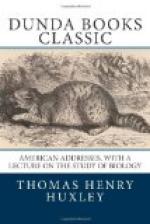Did things so happen or did they not? This is a historical question, and one the answer to which must be sought in the same way as the solution of any other historical problem.
* * * * *
So far as I know, there are only three hypotheses which ever have been entertained, or which well can be entertained, respecting the past history of Nature. I will, in the first place, state the hypotheses, and then I will consider what evidence bearing upon them is in our possession, and by what light of criticism that evidence is to be interpreted.
Upon the first hypothesis, the assumption is, that phenomena of Nature similar to those exhibited by the present world have always existed; in other words, that the universe has existed from all eternity in what may be broadly termed its present condition.
The second hypothesis is, that the present state of things has had only a limited duration; and that, at some period in the past, a condition of the world, essentially similar to that which we now know, came into existence, without any precedent condition from which it could have naturally proceeded. The assumption that successive states of Nature have arisen, each without any relation of natural causation to an antecedent state, is a mere modification of this second hypothesis.
The third hypothesis also assumes that the present state of things has had but a limited duration; but it supposes that this state has been evolved by a natural process from an antecedent state, and that from another, and so on; and, on this hypothesis, the attempt to assign any limit to the series of past changes is, usually, given up.




